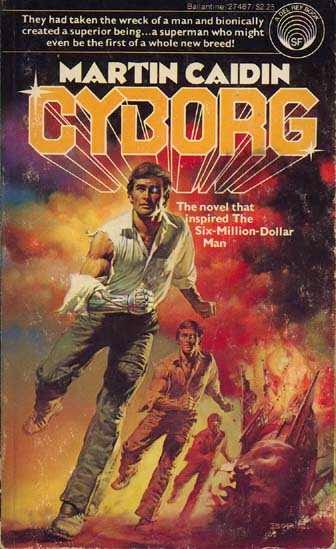This week’s blog title is from a future Asylum movie for SyFy. It’s not in development or anything, as far as I know, but I’m pretty sure just by writing that online I’ve caused it to happen. It’s the internet butterfly effect.
And speaking of that geeky reference to a geeky reference…
What that title really comes from is a note from a friend of mine, the editor at a sci-fi/ science site called Giant Freakin Robot (
check it out—it’s fun and educational). He was explaining what kind of movies and television shows the site covered. To paraphrase, if the zombies have biochemical or viral origins, GFR will cover them, but not if they’re raised by voodoo spells or curses.
Over the past few years, a lot of genres have really blended together. In books and movies, it’s not uncommon to see strong action, drama, or even comedy threads mixing in with sci-fi, fantasy, or horror. Nowadays it’s just as common for protagonists to fight the undead as it is to run from them, and in doing so writers and readers have
created dozens of subgenres.

Personally,
as I’ve mentioned before, I’m a big fan of this. I think any story that stays too much in one vein tends to get dry pretty quick. There’s almost always some humor in every situation, even incredibly dark ones. It’s not uncommon for men and women to have inappropriate thoughts at really inopportune times (or
to act on them). Hey, I grew up on
Doctor Who, so in my mind it makes perfect sense for religion-obsessed barbarian tribes to be descended from intergalactic survey teams or for aliens to be controlling the Loch Ness Monster.
Now, sad but true, there aren’t a lot of firm rules on mixing these things. Every story is different, so the way
mystory blends horror and comedy is going to be different from the way
yourstory blends them. Ten of us can use the same basic plot, but we’re each going to end up with
our own unique story. My characters won’t react the same way as yours, hers will make different decisions than his.
As such it’s hard for anyone to say which amount is right or wrong without having all the context. To use one of my frequent cooking analogies, it’s kind of like if I asked “is this too much sugar?” It’s an impossible question to answer without knowing what I’m cooking, what are the recipe standards, what are my preferences, and what are the preferences of the people who are going to be eating it. My own skill level in the kitchen matters, too, on whether I should be trying a fried Alaska, death by chocolate, or maybe just a bowl of Captain Crunch.
However… all that being said…
I think when these mixed genre stories go bad, a lot of folks tend to look at the small issues and ignore the big ones. Something isn’t bad because it mixed androids and artificial intelligence with Arthurian legends, or because it introduced a lot of comedy into the Cthulhu mythos. Those are just the easiest targets, so they get the criticism first.
What I’ve come to realize is that most bad genre stuff tends to be bad for the same three reasons. Granted, there’s always going to be someone who tries to write a sexy mutant cockroach story (or something worse), and there will always be people who just load up on basic mistakes
like spelling or flat characters or
incoherent plotting. In my experience, though, most genre stuff goes wrong in three basic ways—whether my story is one pure genre or several overlapping ones.
The
firstand often biggest mistake is when authors try to make their stories
too fantastic. If I have an idea,
it gets included in the story. No matter what it is, I’ll cram it in there. If you’ve ever watched old slasher movies, you know most of them just devolved into creative ways to kill people, and sometimes there are excess characters for no other reason but to allow for more inventive deaths. Most of us have probably read a sci fi novel that went to great lengths to explain how the weapons, shoes, uniforms, food, transportation, education, and economics are all very different on that other world or in that not-so-distant future. I read a book recently that had to do with… well, everything. No, seriously. Government conspiracies, bio-engineering, super-soldiers, angels and demons, secret identities,
zombies, aliens from Neptune, extraterrestrial dragons, thrill-killers, child abuse, sadism,
torture porn, regular porn, and lost civilizations in the Amazon. All of these things were major threads and elements in one average-length novel. Heck, I’m tempted to say it was even on the shorter side.
The problem with writing a story like this (book or screenplay) is my audience has nothing to connect with as they’re overwhelmed with all these unfamiliar elements. The people are different. The setting is different. Motivations are different. I may have created the most amazing post-apocalyptic matriarchal feudal society run by a supercomputer (and its secret android army) that’s ever been seen, but my readers need to be able to understand those characters and that society and relate to it right now while it’s on the page in front of them.
This is closely related to the second problem—when the writer tries to explain everything. Bad enough that I felt the need to include the secret android army, but now I’m also going to write about how they were first developed by the Mysteridroid Corporation three hundred years ago, how they see the world, and even how they recharge in various situations. I think most people reading this have read a story or two that suddenly deviated into exposition like that. Edgar Rice Burroughs had an awful habit in his Mars books of having his characters stop and explain various aspects of Barsoomian technology (one midnight walk with the Princess famously spun into a discussion of how radium bullets are manufactured and used). A few recent horror films have gone to great lengths to explain why their antagonist turned out the way he or she did, even though that mystery was part of the character’s strength.
What this often leads to is stories that feel very exotic and detailed, but very little ever actually happens in them. Page after page of explanation can add up really fast, and no matter what my chosen format is, there’s only going to be so many pages. Suddenly a third of my book is just… details. And while I’m going over those details, my characters are just sitting around twiddling their thumbs, waiting for something to happen again. This can also lead to
a bit of resentment from the reader as I’m spoon-feeding them all this information.
As it turns out, problem number
three is the flipside of two. It’s when the writer doesn’t explain anything. I’ve gone through whole chapters of a book trying to figure out which character was
Kristo.
Mystery Science Theater 3000 once had a running gag about a mystical object (or maybe it was a person…) called “the Sampo.” We’ve all seen stories where people ride “twyrfels” and we’re left wondering what the hell a twyrfel is (an animal? a vehicle? some kind of transporter beam?).
There’s also the folks who hide motives and actions to create a sense of mystery. Characters will appear, make a mysterious statement or three, and then vanish from the story. Creepy messages will be found on walls, sidewalks, or computer screens and we never learn how they got there. Disturbing objects are found in the cellar, but never discussed again. Ever.
There are two general causes behind this, in my experience. In the first case it’s when I’ve sunk so far into my fictional world and spent so much time there that I forget the reader isn’t quite so familiar with it. I can tell you the whole history of the twyrfel as transportation, so I forget that you don’t even know what one looks like. In the second case, they’re trying to duplicate the tone of books like
House of Leaves or shows in the vein of
LOST or
Person of Interest, but they don’t really understand how those stories achieved that tone. This is especially frustrating when there’s
clearly no real mystery, just a bunch of withheld information.
So, there’s three big, common mistakes in genre fiction. Sci-fi, horror, fantasy—we could probably give an example of each failing for each genre. We could even make a chart.
Or we could go over a few simple ways to avoid these issues…
For that firstproblem up above, my story needs to have something my audience can immediately relate to in some way, and it’s best if it’s the main character. Someone who hates their job, who wants something they can’t have, or maybe who just feels like an outsider. Simply put, a person with a universal need or desire.

I’ve mentioned once or thrice that
believable characters make for believable stories, and that’s especially true here in the genres. Seriously, pick a popular genre story and I’ll bet the main character has a very humble, relatable origin. Dan Torrance is a nursing home orderly before he’s forced to confront the
True Knot. Katniss Everdeen is just trying to put food on the table when she’s forced to fight for her life in an arena. John Anderson (a.k.a. Neo) was a cubicle drone who was dragged into a war between humanity and sentient machines. Dana, Marty, Jules, and their friends were regular college students before they decided to spend their vacation at that old cabin in the woods. Hell, even in
Pacific Rim, one of the most over-the-top movies of the year, our hero Raleigh is working a construction job when we catch up to him in the present, still shaking off the death of his brother.
If a reader believes in my characters, they’ll believe what’s happening to my characters. It has to do with willing suspension of disbelief—I can’t believe in the big elements of a story if I don’t believe in the basic building blocks of it. Once I’m invested in Wakko’s life, then I’ll be more willing to go with it when he finds a lost civilization under the bowling alley or when he finds out the crab people have been running his life since he was born.
I think there’s two ways to deal with the
second problem, too much information. One is a concept I’ve talked about here in the past—
the ignorant stranger. If things are going to be explained, I should have an actual, in-story reason for that explanation. Yakko may know all about the secret android army, but Dot doesn’t. This gives him a valid reason to talk about the Mysteridroid Corporation for a page and a half. I just need to be sure this really is an ignorant stranger situation and I’m not falling back on the dreaded “
as you know…” crutch.
The other way is, well, for me to just get rid of all that excess information. Cut it. I can delete anything that isn’t actually necessary to the story. This can be tough, because genre stuff tends to involve a lot of new spins on pretty mundane things. Special pistols, close combat weapons, energy sources, transportation, zombie origins… all that stuff I mentioned up above.

But is it necessary to the story, or is it just there
to help push things deeper into my chosen genre? It’s cool that my hero has an energy sidearm that uses ultrasonic beams focused through a blue quartz crystal to set up a harmonic vibration in the target’s cells which causes extreme pain and eventual molecular disruption, all powered by a cold-fusion microbattery… but in the long run is this any different than just saying he has a blaster? Or a pistol? I may have the most inventive take on teleportation ever, but if there’s no point to teleportation technology in my story except to show off this idea… why bother? If the plot flows along fine without it, why take up space on the page with it?
The thirdproblem, not explaining anything, is a little tougher. On one level, it’s just a matter of skill and practice. I need to be a good enough writer to know how my plot’s shaping up and to empathize with my audience.
A friend of mine gave me a great rule of thumb once—my main character should mirror my audience. If my main character’s angry about something, the reader should be angry about it. If my protagonist is puzzled, it means the audience should be puzzled. And if my hero is annoyed because he still doesn’t know what’s going on… well, that’s probably a sign I should have a reveal or two in the immediate future.
The other way to deal with that third problem is to be sure my story actually has
a real mystery, not just the sense of one. Tying in to what I just mentioned, nothing will aggravate my readers more than to stumble through a story alongside my hero and then discover I’m not revealing a single thread of my mystery. Or, worse yet, they might realize there isn’t a mystery at all—I was just stringing them along with some nonsense clues. I need to know what the secret is going to be and work backwards, making sure my characters are smart enough to uncover it or honestly motivated to hide it, depending on which side of the mystery they’re on.
Are these three the only problems that might crop up in my genre writing? Not by a long shot. But these are the ones I see cropping up again and again, so they’re worth looking at and considering. And fixing.
Next time, the last post before Christmas, I’d like to share a little holiday conversation I had with the writer-director of Iron Man 3, back when he was just the guy who did Kiss Kiss Bang Bang,
Until then, go write.
 Now, in and of themselves, none of these are bad character elements. Being the fish out of water isn’t far from being the ignorant stranger. Ninjas are cool. Lots of folks love the Piggers.
Now, in and of themselves, none of these are bad character elements. Being the fish out of water isn’t far from being the ignorant stranger. Ninjas are cool. Lots of folks love the Piggers. Now, in and of themselves, none of these are bad character elements. Being the fish out of water isn’t far from being the ignorant stranger. Ninjas are cool. Lots of folks love the Piggers.
Now, in and of themselves, none of these are bad character elements. Being the fish out of water isn’t far from being the ignorant stranger. Ninjas are cool. Lots of folks love the Piggers. Personally, as I’ve mentioned before, I’m a big fan of this. I think any story that stays too much in one vein tends to get dry pretty quick. There’s almost always some humor in every situation, even incredibly dark ones. It’s not uncommon for men and women to have inappropriate thoughts at really inopportune times (or to act on them). Hey, I grew up on Doctor Who, so in my mind it makes perfect sense for religion-obsessed barbarian tribes to be descended from intergalactic survey teams or for aliens to be controlling the Loch Ness Monster.
Personally, as I’ve mentioned before, I’m a big fan of this. I think any story that stays too much in one vein tends to get dry pretty quick. There’s almost always some humor in every situation, even incredibly dark ones. It’s not uncommon for men and women to have inappropriate thoughts at really inopportune times (or to act on them). Hey, I grew up on Doctor Who, so in my mind it makes perfect sense for religion-obsessed barbarian tribes to be descended from intergalactic survey teams or for aliens to be controlling the Loch Ness Monster. I’ve mentioned once or thrice that believable characters make for believable stories, and that’s especially true here in the genres. Seriously, pick a popular genre story and I’ll bet the main character has a very humble, relatable origin. Dan Torrance is a nursing home orderly before he’s forced to confront the True Knot. Katniss Everdeen is just trying to put food on the table when she’s forced to fight for her life in an arena. John Anderson (a.k.a. Neo) was a cubicle drone who was dragged into a war between humanity and sentient machines. Dana, Marty, Jules, and their friends were regular college students before they decided to spend their vacation at that old cabin in the woods. Hell, even in Pacific Rim, one of the most over-the-top movies of the year, our hero Raleigh is working a construction job when we catch up to him in the present, still shaking off the death of his brother.
I’ve mentioned once or thrice that believable characters make for believable stories, and that’s especially true here in the genres. Seriously, pick a popular genre story and I’ll bet the main character has a very humble, relatable origin. Dan Torrance is a nursing home orderly before he’s forced to confront the True Knot. Katniss Everdeen is just trying to put food on the table when she’s forced to fight for her life in an arena. John Anderson (a.k.a. Neo) was a cubicle drone who was dragged into a war between humanity and sentient machines. Dana, Marty, Jules, and their friends were regular college students before they decided to spend their vacation at that old cabin in the woods. Hell, even in Pacific Rim, one of the most over-the-top movies of the year, our hero Raleigh is working a construction job when we catch up to him in the present, still shaking off the death of his brother. It’s tempting to have everyone get everything right in a story. They understand every reference, know the complete history of every nation on Earth, comprehend every bit of jargon or slang. The truth is though, people get stuff wrong all the time. There are people whose only knowledge of firearms comes from Schwarzenegger movies,and there are folks who got most of their medical knowledge from House. For the longest time, most of my investigative skills came from the Three Investigators and the Hardy Boys, with some fine tuning from Scooby Doo. This is just human nature.
It’s tempting to have everyone get everything right in a story. They understand every reference, know the complete history of every nation on Earth, comprehend every bit of jargon or slang. The truth is though, people get stuff wrong all the time. There are people whose only knowledge of firearms comes from Schwarzenegger movies,and there are folks who got most of their medical knowledge from House. For the longest time, most of my investigative skills came from the Three Investigators and the Hardy Boys, with some fine tuning from Scooby Doo. This is just human nature.






